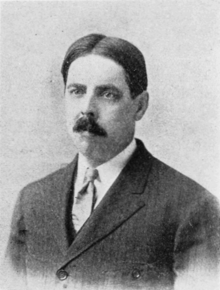Edward Lee "Ted" Thorndike (August 31, 1874 – August 9, 1949) was an American psychologist. He spent most of entire career at Teachers College, Columbia University. He worked on ethology and the learning process. This led to the theory of connectionism, and helped lay the scientific foundation for modern educational psychology.[1]
Edward L. Thorndike | |
|---|---|
 | |
| Born | Edward Lee Thorndike August 31, 1874 |
| Died | August 9, 1949 (aged 74) |
| Nationality | American |
| Education | Roxbury Latin, Wesleyan, Harvard, Columbia |
| Occupation | Psychologist |
| Employer(s) | Teachers College, Columbia University |
| Known for | Father of modern educational psychology |
| Title | Professor |
| Spouse | Elizabeth Moulton (married August 29, 1900) |
Thorndike also worked on industrial problems, such as employee exams and testing. He was a member of the board of the Psychological Corporation, and served as president of the American Psychological Association in 1912.[2][3]
Thorndike's law
changeThe law of effect basically states that “responses that produce a satisfying effect in a particular situation become more likely to occur again in that situation, and responses that produce a discomforting effect become less likely to occur again in that situation”.[4]
Books
changeThorndike's textbooks were widely used in psychology courses for teacher training in the first part of the twentieth century.
- 1903 Educational psychology. New York, Lemcke & Buechner. Revised and enlarged 1910, Teachers College, Columbia University, New York.
- 1904 Introduction to the theory of mental and social measurements. New York: Science Press.
- 1905 The elements of psychology. New York: Seiler.
- 1911. Animal intelligence: experimental studies. New York: Macmillan.
- 1913. Education psychology: briefer course. New York: Routledge.
- 1921 The teacher's word book. 1932 A teacher's word book of the twenty thousand words found most frequently and widely in general reading for children and young people. 1944 (with J.E. Lorge) The teacher's word book of 30,000 Words.
- 1922 The psychology of arithmetic. New York, Macmillan.
- 1927 The measurement of intelligence. New York, Teachers College, Columbia University.
- 1931. Human learning. New York, Century.
- 1932 The fundamentals of learning. New York, Teachers College, Columbia University.
References
change- ↑ Karier, Clarence J. (1986). Scientists of the mind: intellectual founders of modern psychology. University of Illinois Press. ISBN 9780252011825.
- ↑ Saettler, L. Paul 2004, Evolution of American educational technology. IAP. ISBN 1593111398
- ↑ Zimmerman, Barry J.; Schunk, Dale H. (2003), Educational Psychology: A Century of Contributions, Lawrence Erlbaum Associates, ISBN 0805836829
- ↑ Hergenhahn B.R. & Olson, Matthew H. 2005. An Introduction to the theories of learning. Pearson Education. ISBN 978-81-317-2056-1